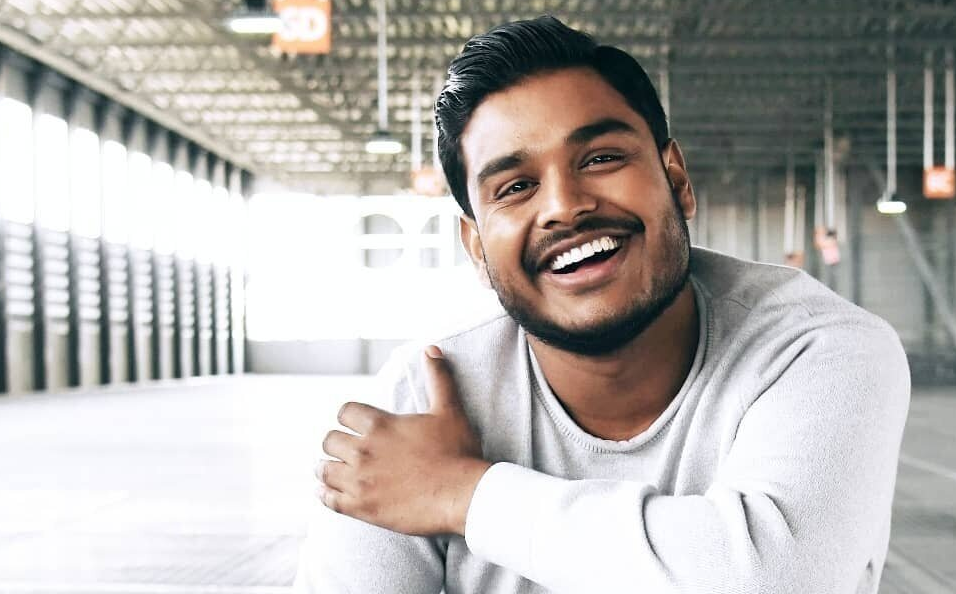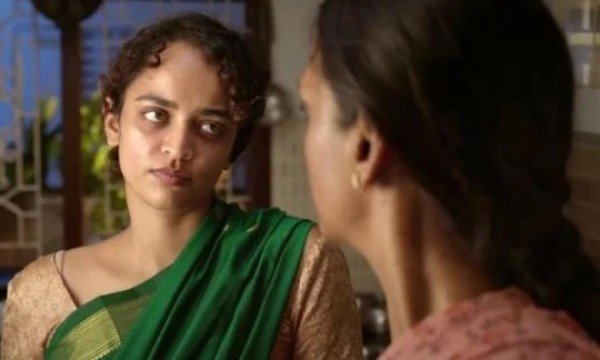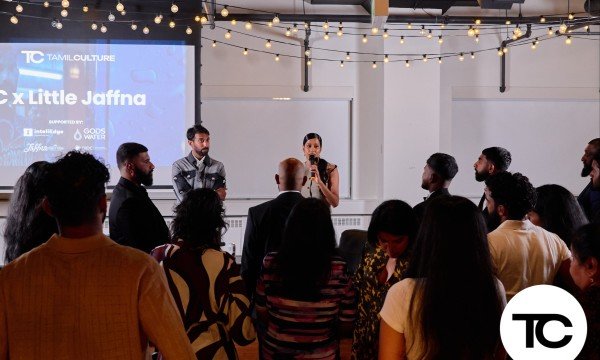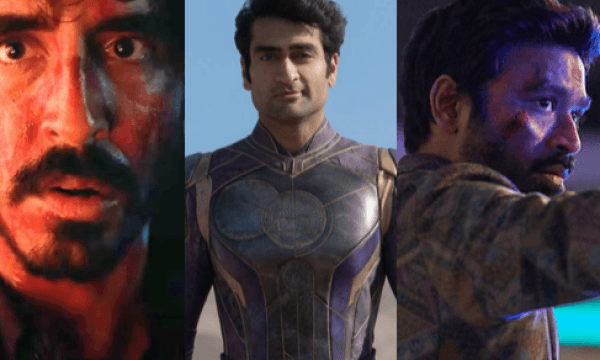
___
***Are you or someone you know in the global Tamil community doing great things? We'd love to feature them: FILL OUT THIS FORM ***
Network & collaborate with Tamil Changemakers from around the world. Request to join our private LinkedIn community here.
___
Tell us about your upbringing (family, where you grew up, etc.) and how that sparked your love of the film/acting/writing.
I was born in Jaffna and immediately got separated from my family during the political unrest. My aunts and cousins raised me until I was seven. Then I moved to Canada, where I finally met & lived with my parents and seven older siblings. As the youngest child, it was always tough for me to be heard or seen, so I was a quiet and shy kid for most of my childhood. Then, in grade nine, I was at a crossroads and needed to break out of my shell. This is when I auditioned for the school production of Romeo & Juliet on a whim with no training or practise. I think the director didn’t want to hurt my feelings, so he gave me the role of reading the prologue. Although it wasn’t the lead, just my few minutes on stage having all those eyes on me made me realize that I do have a voice. From then on, I knew I wanted to continue discovering and sharing my voice through storytelling.
How did you get into acting? How did you react when you got the news that you were in “Spin” (upcoming Disney Channel film)?
I did my undergrad in marketing and worked in corporate advertising, then later in the non-profit sector for almost five years. Although I knew I loved performing, I always felt it just wasn’t in the cards for me. Then, while working for the York Region Arts Council, I began connecting with artists of all disciplines from all walks of life who were following their passions. These artists taught me that it wasn’t about success or making money, but rather doing what you feel is your purpose on this planet. That truly made me think about my legacy and the impact I want to make on the world. That’s when I overlooked the lack of representation on stage & screen and started to train. I began to treat my passion as a craft, a skill to be mastered. I have been taking private classes, masterclasses and workshops since 2017, and I continue to do so. Any opportunity to perform I get along the way, I see it as another learning opportunity, but getting cast in “Spin” was something special. I remember being on a walk with my friends when I got the news and screamed in joy. It was my first union project, which paved the way for me to be a full ACTRA member. Beyond that, It was also my first feature film role, and it was the first Disney Channel film with a South Asian narrative.
When you are so close to getting a part in a potentially life-changing role on TV/film but you don’t get it, how do you motivate yourself to keep going?
Rejection is such a big part of this industry, and I had to do a lot of work to learn how to navigate and manage my emotions when they happen. What I do is create rituals. I have a ritual for celebratory successes but also a ritual for acknowledging rejections. So when I don’t book a role I was hopeful for, I would take a walk with no music and talk to myself. I might look like a weirdo on the streets, but I find it very helpful. I talk through my feelings, acknowledge any negative self-talk and work towards reframing them as positive goals for the future. After that, I eat some feel-good food, usually something deep-fried.
Tell us about “The Orchid & The Tree” which recently was screened at the Toronto Reel Asian International Film Festival. What is it about and what inspired you to write this project?
The Orchid & The Tree explores the relationship dynamics of a Tamil daughter and her father after their mother passes. I wanted to explore a South Asian family where communication was complex. In many cases, the power dynamics of parents and children are explored, with the parents holding power. This made me wonder what would happen if the power dynamics were the same? What if they were both just as lost in their lives like the other? What if they were both going through the same loss, the same struggle? Through this film, that’s what you get to see, a father-daughter relationship where they both meet in the middle to help each other out through a tough time.
Which are you more passionate about - acting or writing, and why?
I started in this industry as an actor and will forever be an actor, but although writing is something I discovered later in my career, it has been making up a big part of my life these days. I love the autonomy and freedom I have as a writer. I also don’t write with commercial viability in mind. With acting, by the time the role comes to me, it has been vetted, edited and transformed into something approved by multiple gatekeepers and powers that be. As a writer, I don’t have to worry about what the market wants or what hashtags are trending. I just write the stories I see missing in the world and give them space.
I know historically, the creative arts were often looked down on, in the Tamil community in terms of as a viable career option. How have your family and friends supported you through your journey?
My family, like many others, had my best interest in mind and wanted me to be a doctor. However, when I came forward with my acting aspirations, our happy medium was marketing. Don’t ask me how that makes any sense. Yes, doing a degree and being in the workforce delayed my artistic start by about nine years, but ultimately I was glad I did it. A huge part of being an artist is being an entrepreneur, and I use my management skills every day to find funding, market my content and network. So, to answer your question, once my family saw that I had a degree in the back pocket and had a plan for approaching the arts, they were very supportive. The same goes for my friends. I empathize with those who were hesitant to support me because this career is not for the faint of heart or spirit.
In order to make acting a viable career, you need to make money to sustain yourself. How did you plan this out?
This is the question of the century. Making sense of the financials of this career was probably the most challenging part of it all. I had someone tell me once that it's a journey, not an overnight change. I don’t know if I’d recommend anyone to quit their day job immediately and jump into the deep end. It’s more of a slow process of learning and changing. I had a full-time day job, and I started with a few classes on the side. Once I booked a few gigs and received positive feedback from casting directors, I knew I should invest more time into training. Since I was making some money, it justified me investing more money for classes. I do this check-in of revenue versus investment in my career a few times a year. It allows me to gauge my growth as an artist and as a creative entrepreneur, so that my expenses always line up with a revenue. After doing this for a few years, I started making enough revenue to quit my job to invest more of my time into training and auditioning. The other side of it is having multiple sources of revenue. Once I realized I had a knack for writing and directing, I started to invest in training in those areas, then later applying for and booking paid opportunities. When one aspect of my career is dry, I focus on the other and keep myself busy that way.
How do you use social media to help promote yourself and create opportunities? Discuss the impact of networking in terms of creating opportunities for yourself.
Networking is everything if you want to have a sustained and long career. The obvious thing to do as an actor is get an agent and have them submit you for opportunities. This is a great place to start, but that leaves all your eggs in one basket and gives the power to the industry. By meeting other emerging careers in the industry and collaborating with them, you take the power for yourself. When networking, I don’t look to meet super successful celebrities but instead people who are at the same stage in their career as me, or just a few years ahead. These people are more available to support you and provide you with actionable advice relevant to where you are at today. Social media has been a great way to learn about and meet these people. Facebook has been great for community building through groups like BIPOC TV & Film, and Instagram is great for keeping a pulse on the industry by following organizations and leaders.
_____________________________
Related Articles:
- "The Tamil Creator Podcast (EP #50): Thad Jayaseelan - Jet-Setter, Budding Entrepreneur & Go-To Barber For Athletes & Celebrities Like Drake And Big Sean"
- "The Tamil Creator Podcast (Ep.49): DJ Kow - Trailblazing & Popular Toronto-Based Female DJ"
- "The Tamil Creator Podcast (Ep.48): Gobinthiran Kulendran - 9 Schools And 21 Location Changes During A War Couldn't Stop This Entrepreneur From Finding Success"
- "The Tamil Creator Podcast (Ep.47): Mathusha Senthil - Founder/CEO of Sex Toy Company (Thaen Pot) & Media Platform (Thaen X)"
- "The Tamil Creator Podcast (Ep.46): Ruban Kanapathippillai - Serial Tech Entrepreneur With Two Exits Collectively Over $1 Billion"
- "The Tamil Creator Podcast (Ep.45): Sharon Bala - Award-winning & Bestselling Author of "The Boat People""
- "The Tamil Creator Podcast (Ep.44): Vas Saranga - Canadian Actor, Writer & Entrepreneur (TheOnlineActor.com)"
- "The Tamil Creator Podcast (Ep.43): Roveena - Multi-Award Winning Canadian Recording Artist, Songwriter & Pianist"
- "The Tamil Creator Podcast (Ep.42): Kartik Bala - CEO & Co-Founder of SnapSmile, AI-Driven Oral Health Monitoring App"
- "These Tamil Entrepreneurs Share How They Grew Their Side Hustles"
_____________________________
What do you do outside of work for fun?
I love gardening! Back home, I spent a lot of time roaming the fields and grounds I lived on. As a kid, you’d find me climbing the jackfruit tree and cooking in clay pots. So these are traits that have stuck with me for life. In elementary school, I’d sneak into neighbours' gardens to steal flowers and vegetables. Now, as an adult responsible for managing my own money, I spend a ridiculous amount of time and money on my garden. I especially like to grow tropical crops like okra and bitter melon.
In terms of your personal legacy, in a few sentences, describe how you want to be remembered by your family and friends?
I want to be remembered as someone who never left a rock unturned. No one knows the future, and I don’t know what mine holds. All I know is in this moment, this is what I am meant to be doing, and I am going for it. In ten years, if my calling turns into starting a garden centre, then I will pursue that with the same vigour. I feel we spend too much time labelling things and people as this or that and putting expectations on them. I’d much rather focus on experiencing the thing. So in terms of my film legacy, if my films impact even one person, I’d be happy with that.
Who is one person from the global Tamil community and one person that isn’t Tamil that you admire and why?
If I had to pick one Tamil person I admire, I would say my father. He has so many qualities that I admire and aspire to have. His perseverance, capacity for love and selfness are all traits I revere. At the moment, I am in awe of writer/director Bong Joon Ho. Not only is he an incredibly talented and successful BIPOC filmmaker, but I appreciate how he treats the craft. He looks beyond the industry's glamour and makes movies because he can’t fathom doing anything else. His level of dedication and commitment is inspiring.
What do you think you would tell 16-year Ganesh looking back?
Being different is your superpower.
What is your favourite book(s) you've read recently or a podcast(s) that you've listened to recently that's had an impact on you?
The Four Agreements by don Miguel Ruiz - This book is a short and simple read that has helped me take control of my internal monologue and not take life so seriously.
What is a new belief, behaviour or habit that has most improved your life?
Learn one new skill at a time. Master it, then move on to the next.
If you were given $1 billion, how would you allocate the money to change the world?
I wouldn’t even know how to begin answering this question. But, I’d probably find people in the non-profit sector who do know what they are doing and get them to use the funds as they see fit.
How would you describe the impact that the Toronto Tamil community has had on you personally and on your career?
Immigrating here, facing the bullying and judgemental faces, I didn’t want to be Tamil. I felt the only way I could get ahead in life was to be anything but “the brown kid.” Then in university, I got involved with the Tamil Students' Association and met other Tamil kids who were so passionate about their culture. They taught me that they don’t need to compromise or hide their identity to be successful. Once I accepted that, it made my life easier cause I didn’t have to spend so much energy pretending. Beyond that, when I started to embrace my identity, the Tamil community was so welcoming. I didn’t realize how we were just killing it in all aspects of society. Two of my mentors, V.T. Nayani and Maya Bastian, are so proud of their Tamil identity and have helped me navigate mine as I progress in my career.
What is your favourite Tamil food (meal or dessert)?
Seeni Sambol anything.
What is your favourite Tamil movie?
Padayappa.
What does Tamil culture mean to you?
If I’ve learned anything from my journey away from and back to my Tamil culture is that there is no one way of being Tamil. Instead, it is a complex culture carrying the weight of so much intergenerational trauma. So for me, Tamil culture means eating a $40 Italian pasta and still not being satisfied till you come home and eat leftover chicken curry.
**Looking to create your love story? Join the other couples who have dated and married through myTamilDate.com!**
"myTamilDate Success Story: It Was Love At First Sight For Madhu & Niya"
"myTamilDate Love Story: Jenani & Nav Found Each Other At The Right Time And Right Place In Life"
"myTamilDate.com Love Story: Tharshi & Ravi Found Love During Lockdown"
"How France Met Canada: A MyTamilDate.com Love Story"
***CLICK HERE to listen to us on Spotify!***
Related Articles:
- "Award-Winning Tamil-American Author And Educator SJ Sindu, Releases Second Novel Called "Blue-Skinned Gods" That Explores Identity, Faith, Family & Sexuality"
- "Serial Entrepreneur Vinoth Kumar Created Singapore-Based App ABL-ify To Remove Stigmas Around Autism In Asian Communities"
- "Boston-Based Suba Suntharalingam Overcomes Challenges As An Immigrant To Start Non-Profit Providing Opportunities For The Wounded, Widows and Orphans of War In Sri Lanka"
- "Elite Athlete, Coach, Future Chiropractor & Entrepreneur Abirami Shanmugaratnam Is Making Waves In The Athletic Performance Industry"
- "Toronto's OG Food Writer Suresh Doss Is Using His Reach And Voice To Help Engineer A Comeback For Beleaguered Restaurant Industry"
- "Ballet And Kung Fu Trained Australian Actress & Writer Rubi Balasingam Is Promoting Tamil Voices In Aussie TV And Film"
- "Yathusha Kulenthiran's Marketplace For Environmentally Sustainable Palmyra Products Empowers Female Artisans In Sri Lanka"
- "Australian-Tamil Entrepreneur Sujan Selven Is Creating Economic Opportunities For Remote Villages In Northeast Sri Lanka Using Upcycled Devices & Improved Connectivity"
- "Crypto Tinhorn & Former Journalist Anand Venkateswaran Talks About Buying A $69M Digital Art Piece, Collecting Stories & Catalyzing Change"
- "Tamil Innovators Spotlight: Abarna Raj, CEO of Australian Social Startup Palmera, Is Tackling World Poverty"
- "Tamil Innovators Spotlight: Tea Drops CEO & Founder, Sashee Chandran"
- "Tamil Innovators Spotlight: Knowledgehook's CEO, Travis Ratnam"
- "Tamil Innovators Spotlight: Kabo CEO & Founder, Vino Jeyapalan"
- "Danny Sriskandarajah's Journey From Rural Sri Lanka to CEO of Oxfam Great Britain"
- "The NBA Bubble: Dr. Priya Sampathkumar Helped Make It Happen"
- "These Tamil Founders Behind Agritech Startup Dunya Habitats Want To Alleviate Food Security Globally"
- "Marketing Maven Jackson Jeyanayagam Shares Insights From His Illustrious 20-Year Career"
- "Angel Investor Jay Vasantharajah On Building His Portfolio One Day At A Time"
- "Breaking Into Hollywood: Meet Tamil-Canadian Actor Vas Saranga"
- "Meet Rebecca Dharmapalan - Filmmaker, Legal Scholar, And Activist"

























